This is the life! We drank three rounds with Tick, Tick… Boom! stars Andrew Garfield and Robin de Jesús
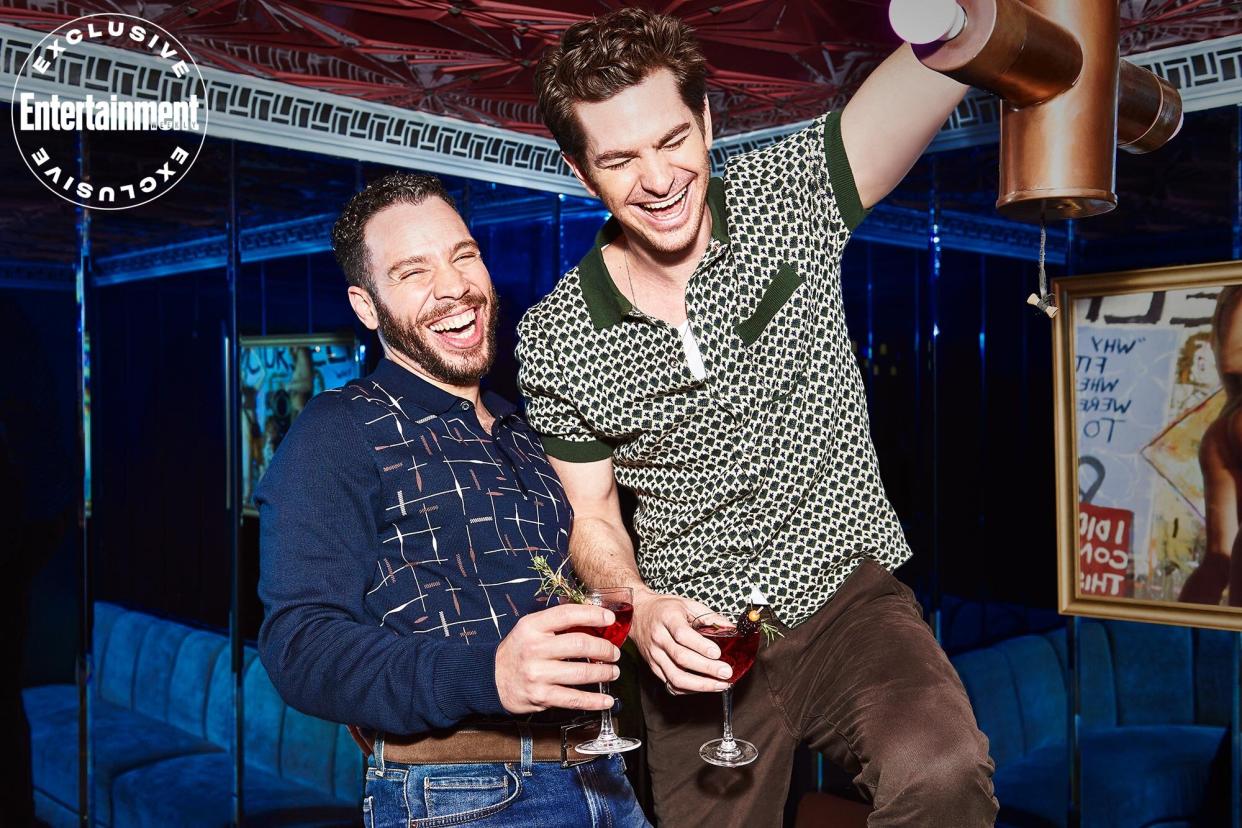
- Oops!Something went wrong.Please try again later.
- Oops!Something went wrong.Please try again later.
Jessica Chou for EW Robin de Jesus and Andrew Garfield
All it takes is a beat.
As I clap out a pulse on my lap, Andrew Garfield throws his head back and shuts his eyes, an electric closed-mouth grin spreading across his face as he launches into "Boho Days," Jonathan Larson's slice-of-life anthem that is rife with the Rent composer's humor and zest for life.
Garfield's Tick, Tick… Boom! costar Robin de Jesús joins in on the song immediately, his eyes sparkling. And before I know it, I'm singing too.
It's a reflection of the infectious joy Larson lived with, his need to create art and a party for everyone he met — and the ineluctable way Garfield and the rest of the cast of Netflix's Tick, Tick... Boom! capture that on screen in a musical that's all about the pressure of a perceived ticking clock and wrestling with a creative soul.
The three of us aren't on stage, but instead gathered round a table in Hollywood at Tramp Stamp Granny's, the piano bar founded by Darren Criss and his wife, Mia, that serves as a Marie's Crisis West for all the musical theater nerds who crave sunshine over concrete.
Over three rounds of themed mocktails (it's before noon on a Saturday, and the guys have a gauntlet of a press tour ahead), we dive into the making of Tick, Tick… Boom!, the experience of working with Lin-Manuel Miranda on his directorial debut, and leaving room for the spirit of Jonathan Larson in every take.
There's a lot of laughter, some tears, and an abundance of love between the two actors, who play longtime best friends Jon and Michael on screen and seem to be on their way to the same relationship off screen. But the ship is sort of sinking, so let's start drinking.
Round 1: Boho Days
ENTERTAINMENT WEEKLY: For both of you coming into this project, how familiar were you with Jonathan Larson and Tick, Tick... Boom! specifically?
ROBIN DE JESÚS: Jonathan and I go way back, even though we never met. When I was 14 years old in high school, hanging out with musical theater nerds for the first time in my life, and someone was like, "Yo, let's listen to the Rent cast recording." They might have even said soundtrack, which if you're a Broadway die-hard, you're like, "Hey, someone called a Broadway cast recording a soundtrack, that is discriminatory. That is a violent act." [Laughs] I remember looking at the cast album thinking, "Oh shoot, there are Black and brown faces coexisting with white ones on the cover." I had never seen that, and there was a permission that was granted to me in that to participate. Someone started playing the music, and I was like, "I don't know how I feel about this rock music." But 'One Song Glory' came on, and I vibed with it. I just fell in love with the rest of the album. Years later I made my Broadway debut in Rent. Jonathan gave me my first job; he gave me financial stability; he gave me creativity, unity.
ANDREW GARFIELD: That's so beautiful. And the community, the inclusion, the diversity, the radical nature of that coming from a guy that had sex with women, that was white-skinned—
DE JESÚS: He was an ally!
GARFIELD: In the realest sense. But for me, it was a very different thing because I came to the theater later in my life when I was 17. I was only really introduced to what theater was then, and it wasn't musical theater. It was strange, esoteric, European devised, art-house theater — the Théâtre de Complicité, Simon McBurney's company. At drama school, I studied Shakespeare, Miller. It was a straight theater training. So when Lin asked me to do this and he introduced me to Jonathan Larson's work — I was aware of the music in Rent, but only peripherally in my semi-unconscious — and it was like he was re-introducing me to a long lost brother that I didn't know I had. There was this strange lineage and kinship. An ancestor that I didn't know I had that was looking out for me all this time and was just waiting for me to get here so that I could help be the channel for his spirit to come back and to affect the world with his music, with his unfinished song and to continue that song for him.

Jessica Chou for EW Robin de Jesus and Andrew Garfield
Robin, you worked with Lin-Manuel Miranda on your breakout Broadway role playing Sonny in the original cast of In the Heights. What was it like reuniting with him? Was there a shorthand already there?
DE JESÚS: It was like liberation. We know each other so well that it could just be a look or a joke, and the punchline tells me what the note is he's trying to give me.
GARFIELD: I saw that with you guys. It was so cool. I saw him and Robin just privately look at each other, and Robin's like, "I got you, I got you, I got you, I got you. Don't say anything. Don't say anything. I got you. Thank you, thank you. Received, received."
DE JESÚS: They always made fun of me because when someone's giving me a note, I'll listen. I go, "Uh-huh, uh-huh, uh-huh." And I'm a bit of a space cadet, so I feel like my face naturally is a little floaty, and so I know I have to let people know when I'm receiving the note. So he'd give me the note, and I'd go, "Receiving," so that he would know I got the message. But [Lin] also was just so joyous, and he gave me permission to speak whatever language I naturally spoke. Because I code switch. I sometimes speak in Spanish, sometimes speak in English. And we would just speak Spanish across the room at one another. White supremacy taught me that I have to use my professional voice and that my professional voice is always going to be in English, and it always presents with proper diction. And I'm a working-class dude. That comfort with him — that was true liberation. He's my friend, and I care about him, and I love him, and this group was real lovey-dovey, real spiritual. We're pretty corny together.
GARFIELD: We've got to rein it in a little bit.
DE JESÚS: Otherwise, we'd be basket cases. We'd be crying all week. Lin is even worse—
GARFIELD: He's the Pied Piper of inappropriate, excessive crying.
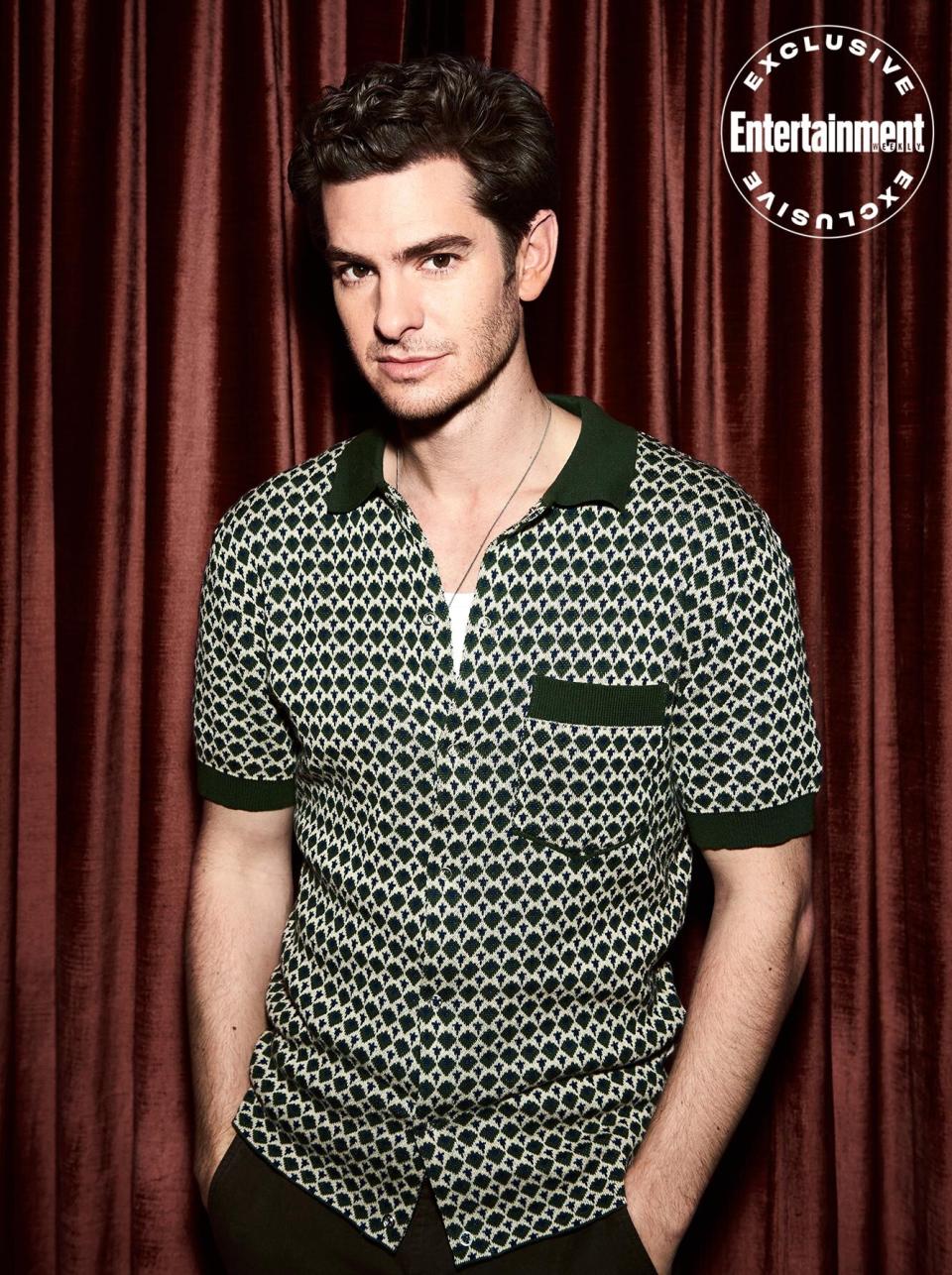
Jessica Chou for EW Andrew Garfield
Andrew, you said you were jealous of that at the start, but how did you evolve or broker your relationship with Lin? Were you taking cues from his relationship with Robin and trying to take advice or anything like that?
GARFIELD: No, this was a special thing that Robin and Lin had. I joked that I was jealous of it, but it was more just like I was like, "That's cool. That's such a beautiful thing." Me and him developed our own shorthand, and it happened really early on. Before we started shooting, I saw the schedule, and I said, "Wait a minute, you want to shoot me singing 'Why?' in the Delacorte [Theater] in Central Park alone in the middle of the night — the emotional apex of the journey for this character, at the end of the first week of filming? Are you a sadist?" He was like, "No, no, buddy, it's great. You're going to dive right in, and you're going to get it out the way, and the path will be clear for the rest." I'm like, "Don't bulls--- a bulls---er. Why are we doing this at the end of the first week?" He was like, "I'm sorry, I lied. It's because we're going to lose the location." From then on, there was no filter between us, and we could talk about anything. There were moments on set where I was having a hard time with things in certain scenes, and he was like, "Let's take a walk." And I'm like, "Okay, we can just take a walk and talk about it? And I don't have to be angry, and you don't have to be angry? We can just figure it out together?"
DE JESÚS: I come from guerilla filmmaking where you don't have time, so it took a minute to realize, "Oh, we can discuss this right in the middle of a shooting day?"
GARFIELD: Because Lin knows what matters is that you and I, and the rest of the company, feel free, spontaneous, playful, alive, heart-bursting while the cameras are rolling.
The two of you were playing two longtime best friends. You said the set was very lovey-dovey by nature. But what types of things did you do to establish that friendship? Were you hanging out a lot off set?
GARFIELD: It was just immediate.
DE JESÚS: It was immediate, but also we're theater nerds, and I felt like we immediately clicked on that nerdiness and the giddiness and the excitement of "We get to sing!"
GARFIELD: Because I was a closeted musical theater person.
DE JESÚS: I love when straight dudes fall in love with musical theater.
GARFIELD: I was discriminating against myself. You know when you see someone in the world, and you're like, "Oh, I want what they have," and it resonates. It starts to bring out that part of you that you didn't know you had. That was what I felt as soon as I was with Lin. I felt like I had found another tribe. But [Robin and I] screen-tested together. Literally, as soon as you came in, I was like, "Oh no, it's done. We haven't even got to read." It was just like, "Oh, I love this person. I see this person's heart, and I want as much of the world to see this person's heart and talent as humanly possible. And this is just right."
DE JESÚS: You know what's funny is I didn't know what was happening at that callback, but I do remember that when I was leaving, you gave me dap and you gave me a hug. And there was something about the way we embraced that I just felt like, "Hmm, there's something happening here. I think I got benefits and insurance for the rest of the year."
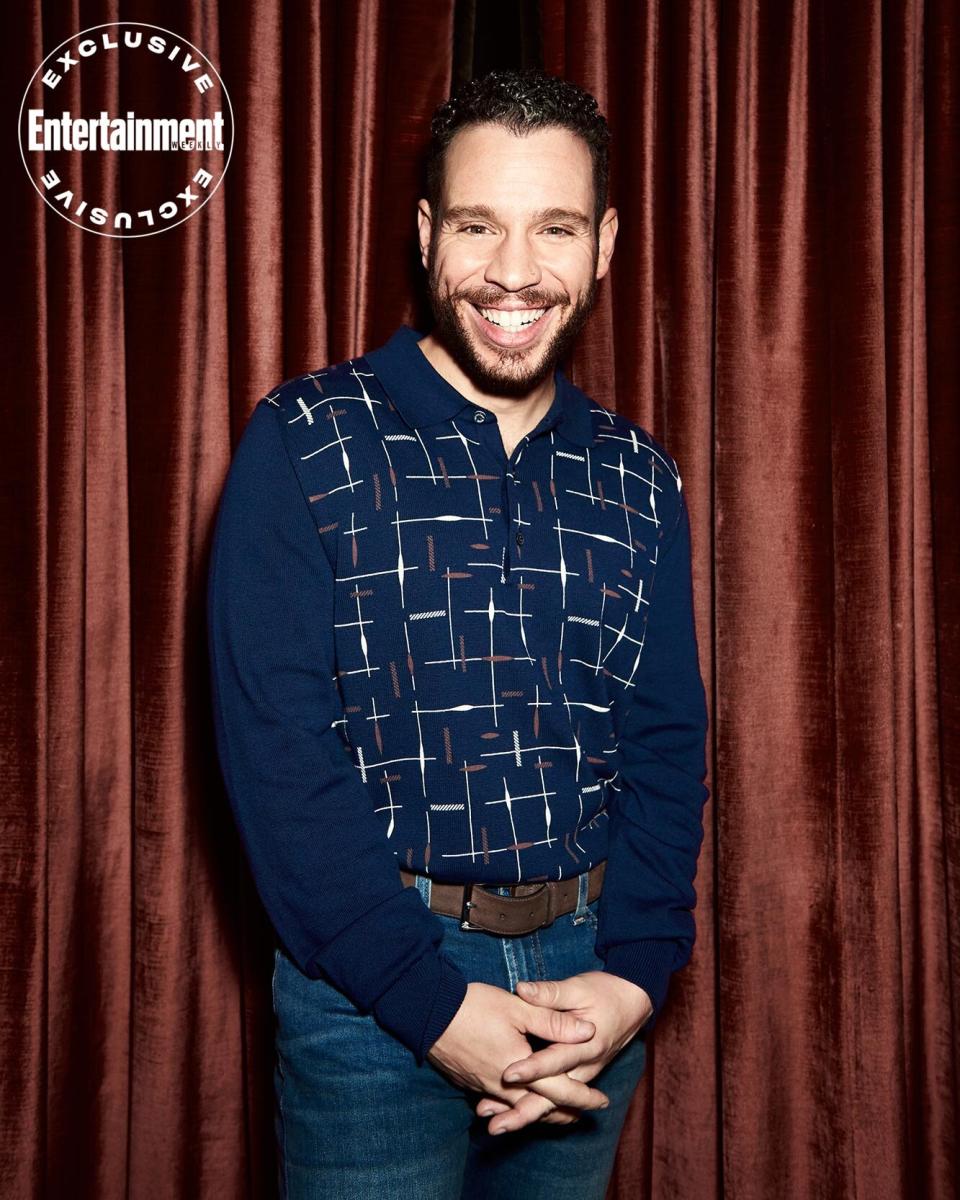
Jessica Chou for EW Robin de Jesus
You both have starred in and received accolades for appearing in two of the most seminal works of gay American theater ever produced, and that's also something that Larson explored in his works. How did those experiences either shape this or forge your connection and your approach to the work as a whole?
DE JESÚS: The Boys in the Band was the last movie I did, and I was playing a Puerto Rican man in 1968 experiencing gay oppression. There's an accumulation of that that I had to deal with in Tick, Tick... Boom! as well. It was just changing the timeline and seeing how the oppression manifested differently. But it was also really cool to clock, "Oh, I don't know that I have ever seen an HIV/AIDS diagnosis of someone of my ancestry in that period." Because so many of our Black and brown AIDS stories from that period got colonized, and it was only white gay men got to tell that story. Now to get to come in and insert me is like, "That's right. I have a right to be here." I should have been here a long time ago, so I've got to make sure that I do this right so that this isn't the last time.
GARFIELD: I was just finishing Angels in America, and then Lin said, "Hey, we want to do a workshop with Tick, Tick... Boom!" I'm like, "Great. When?" He was like, "The day after your last performance of Angels in America." I'm like, "No, I'm good." And he was like, "You can do it," in that Lin way. I was like, "I loathe you, and I love you." So I arrived, and I did it, and I was flattened. But then, of course, as soon as we started working on it and reading the scenes and working on the music, you come alive.
Then, something really crazy and profound started happening where I was like, "Oh, these things are... It's one thing. Tick, Tick... Boom! and Angels in America is in the same cinematic universe." I was talking about Prior Walter, and I was suddenly like, "Oh my God, I get to keep honoring my friend. I get to keep close to Prior." Because I didn't want to let go of Prior. I never want to do the play again in my goddamn life. That nine hours of life and death and angels and hell and heaven and sickness and loss, I was ready to not do that. But I got to stay close to him. I got to hold him under my wing for the next three years as we prepped and shot and now talk about this film. Prior is a symbol of that lost generation of men. And that's what it felt like every night doing that play. It felt like it was for the incarnate audience that were there every day, but it was for all of the ghosts, all of the people that they had lost, they were bringing into that theater. You could feel it every single night that we were honoring the dead. And that's part of Prior's last monologue that he says, and this felt like this amazing continuation.
DE JESÚS: That's why I f--- with you. Because there is something to someone who recognizes spirit and ancestry. There's an awareness of a responsibility, not in a way of nobility, but you acknowledge the collective. When you tie that into the preparedness, we would be in a place in front of the camera where divinity could just come in. We were very aware that there was this other presence in the room. And that was so cool to have that collective consciousness as opposed to the isolated experience of it.
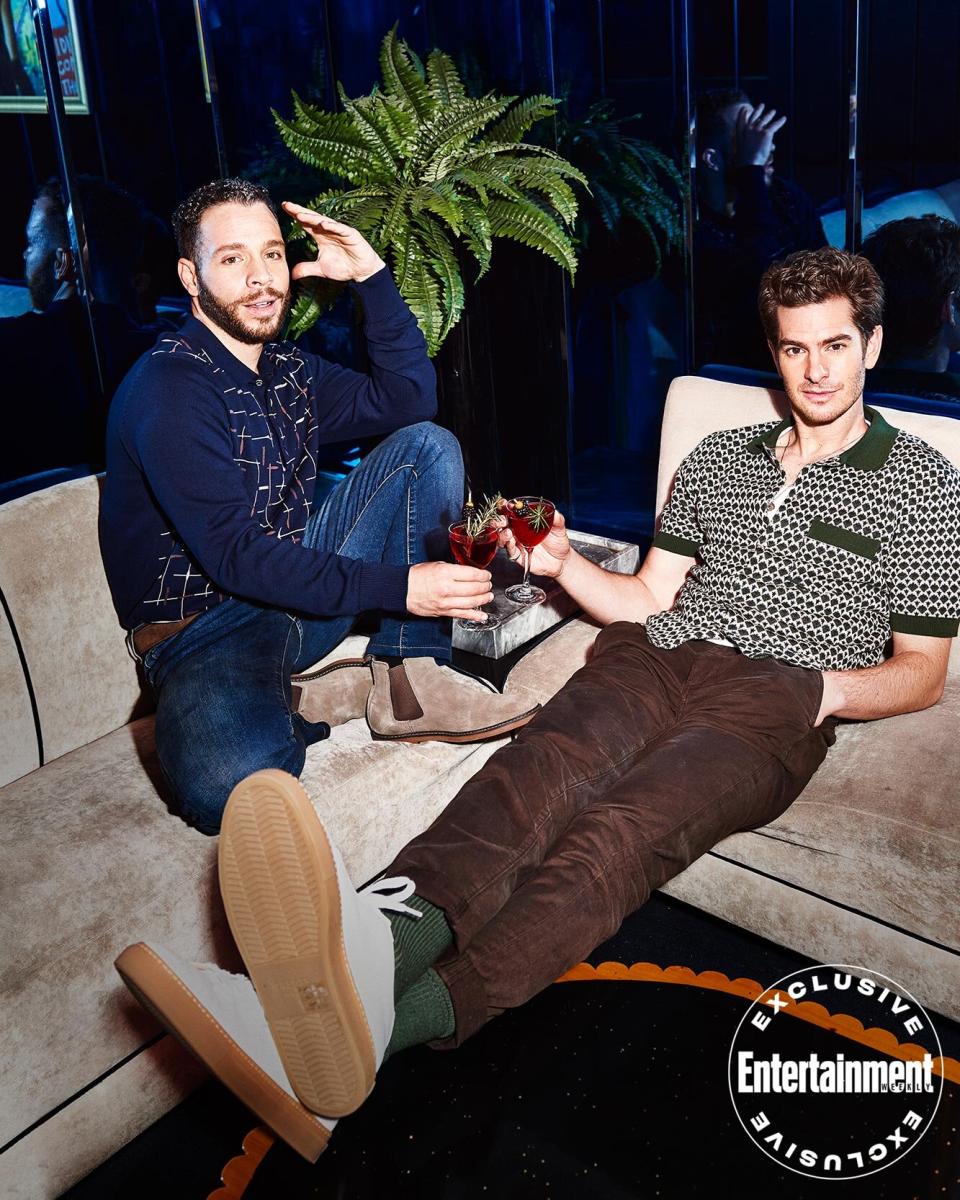
Jessica Chou for EW (L-R) Robin de Jesus and Andrew Garfield
ROUND 2: THE BLACKER THE BERRY
As a theater lover, watching this film is just such a joyous, infectious experience. Was it like that for you on set, and what embodied that, whether it was filming "Boho Days" or all the cameos?
GARFIELD: Lin sets that tone. It was the most joyous film set I've ever been on, and I think it was because it was more like a theater rehearsal room. Lin created the space, he created the playpen, and then he wanted us to just run around. With Jon, it was exhaustive, the preparation I did. But it was exhaustive enough so that I could get onto set and say, "Come through me. Do what you want to do." To be honest, that's the kind of actor that I've always wanted to be since I was in drama school, but I haven't had the courage to really fully dive into that. This was the first time I really felt I gave myself permission, and I was given permission by Lin, to not know where a scene was going to go and to let it be spontaneous and to let it be alive because that's when magic happens. That's when the spirit comes through. With Jon, thank God, his spirit was ready to come through. He was like, "I'm ready. I'm in the starting blocks. Just get out the way, and I will tell you where to stand. I will tell you how to sing. I will tell you where to be, and it will just happen." It was like a communing with this musical theater legend.
DE JESÚS: Jonathan would make himself known. He would just be showing up. You'd be like, "Can you knock on the door first, please?" No, no, no, don't. He's always welcome. The door is open. I remember at one point remembering an affirmation that I learned at this church I used to go to, and it was like, "Use me, God. I stand for you." When you recognize that what we do is church, and that we're devout patrons of that same church is when you can lean into that spirituality. It's so beautifully safe because it shuts up the ego that always wants to distract and pull you away from the job.
With all that joy on set, was there one moment for each of you that was the most pinch-me moment of the experience?
GARFIELD: One of the most joyful moments was doing "No More" with you, especially, there was a take where I took my shirt off.
DE JESUS: [Laughs] I forgot that.
GARFIELD: Just before the big finale where we come out in our tuxedos, there's a last bit where we're in the new "new" apartment. And I said to Lin, I was like, "Hey, I just want to try something on this next take." And he was like, "Well, of course. You always do." And I was like, "Okay, great." And you know when we are kind of jumping across each other, just before that, I'm supposed to do this: [Garfield raises his arm]. And then on one of them, I ripped my shirt off, so I ran around with my white, pasty body out. It made you crack up.
DE JESÚS: We had to redo the take because apparently, I stopped lip-syncing.
GARFIELD: The editor was on the other side of the world because he had a live feed of all the dailies that were coming through. And he texted me, and he was like, "What are you guys doing? What is going on?" But at the premiere the other night, Lin sat behind me. We kept grabbing each other and holding each other. And at that point, he was like, "I should've used the shirtless scene."
Release the shirtless cut!
GARFIELD: Yeah, release the shirtless cut!
DE JESÚS: We were giddy. There's something about whenever the Carlton [dance move] comes out, you know it's about to get crunk. You know what I'm saying? Something is going down.
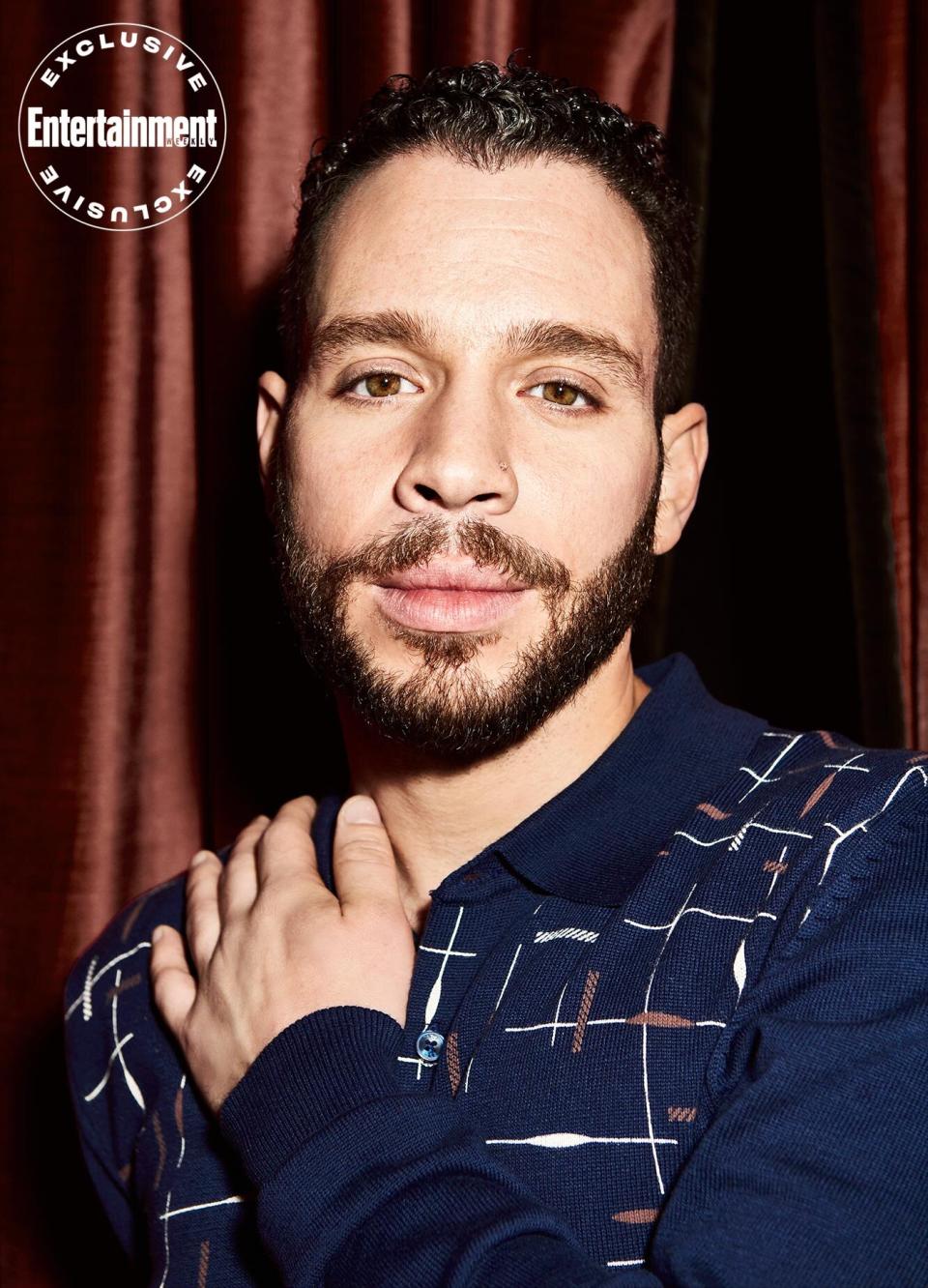
Jessica Chou for EW Robin de Jesus
Robin, you have probably the most heartbreaking scene in the film, which is when you tell Jon about Michael's diagnosis. How did you prepare for that and get in the right headspace?
DE JESÚS: Lin had the audacity, like you, to make that my first dialogue scene. I'd shot one little thing that was just me in the hospital waiting on the diagnosis, and then that was the first real scene. I remember getting to set that day and thinking, "Okay, so he did me dirty. That's not cool." I realized that the way I had rehearsed the scene wasn't how it felt that day, because I know for my friends, when they share their status, they oftentimes don't get to have that release where they get to be taken care of — because they end up having to take care of the person that's receiving the news. I felt like that was the dynamic for us. That as much as it was my diagnosis, I also had to be his caretaker. I had a moment where I didn't trust that. And then, thankfully, I leaned into it. I knew the only way for that to work was if the scene in the street went a certain way. If that scene doesn't go a certain way, then the one with Jonathan is not going to play out right.
GARFIELD: You came ready. I'd never seen you so intense.
DE JESÚS: There was something about that scene that to me, that was going to be the most important one for Michael. I really wanted to honor Jonathan.
GARFIELD: But remember that night, there was lots of technical difficulties. There was this 40-45 minute respite break period, and you were communing with the f--ing angels. And I was like, "You guys are f--ing around with a hotdog stand? Who gives a f--- about the hotdog stand? This guy is ready to explode." I was like, "Roll, motherf---ers. Roll. It doesn't matter. Capture this s---." Because it was bursting out of you, and that doesn't happen often.
DE JESÚS: I have to share something with you that I never shared with you before. I don't know why I'm taking this moment out in front of all this, but I will never forget that night you were shooting, and it was time for your coverage, and you asked for two more takes. And you said, "I'm so, so sorry." I was like, "No, no, we good. We good." And you said, "No, no, no." He's like, "Your work is so good right now that I want to be at your level." I didn't know I needed to hear that. I needed your affirmation. I needed you to see me.
GARFIELD: I see you, baby. I see you.
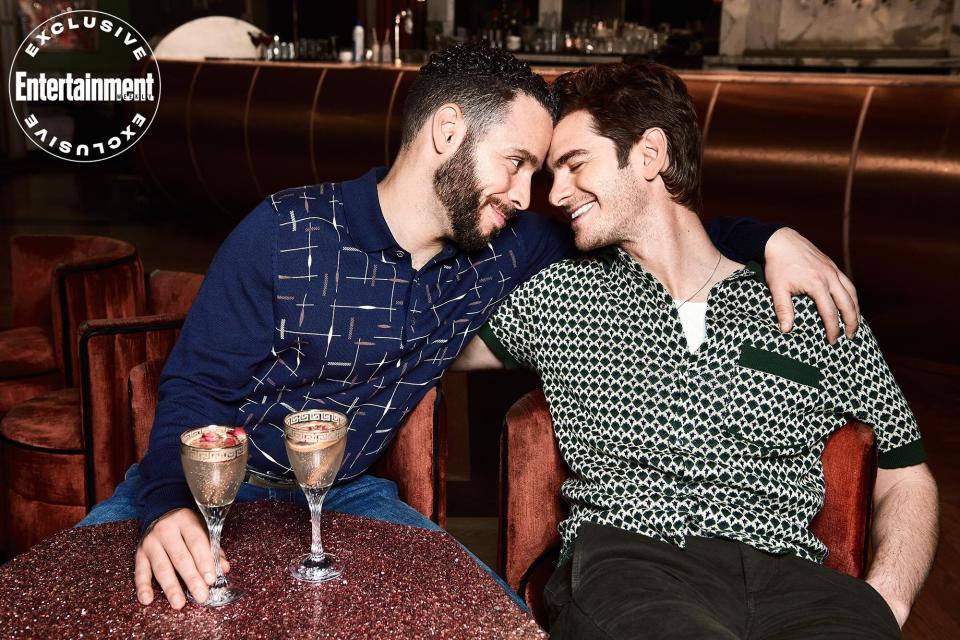
Jessica Chou for EW
ROUND 3: I Feel Bad That You Feel Bad
What lyrics from Tick, Tick... Boom! do you think best sum up the experience?
GARFIELD: "What a way to spend the day."
DE JESÚS: I affirm that. That's better than what I was going to say.
GARFIELD: What were you going to say?
DE JESÚS: "Fear or love, baby." That was a lesson for me. I had been centering fear in my career for so long, and I didn't identify it as that, and then I got to the place of that good, good love.
Andrew, I know you talked a lot about learning to sing for this, but what about the piano playing? What was that like for you? Did you already have any familiarity with the instrument?
GARFIELD: Not at all. I'm not not musical. I have a musical ability. I used to play guitar when I was a kid and the clarinet. And I love music. I don't have the same gifts in this that someone like Robin or Lin would have, but when I apply myself to something, I can do it. So when I was told, "You don't have to play piano for this," I was like, "No, no, no, I want to. I want to get as far as I can get." I learned "Why?" by rote. I learned some of "30/90" by rote. I learned as much as I needed to by rote, and now it's pretty much all gone because I haven't had the chance to continue with my practice. But I loved it so much. I got a piano in my house in London, and I was going through all the beginner kids books of how to learn piano. It was just so pleasurable.
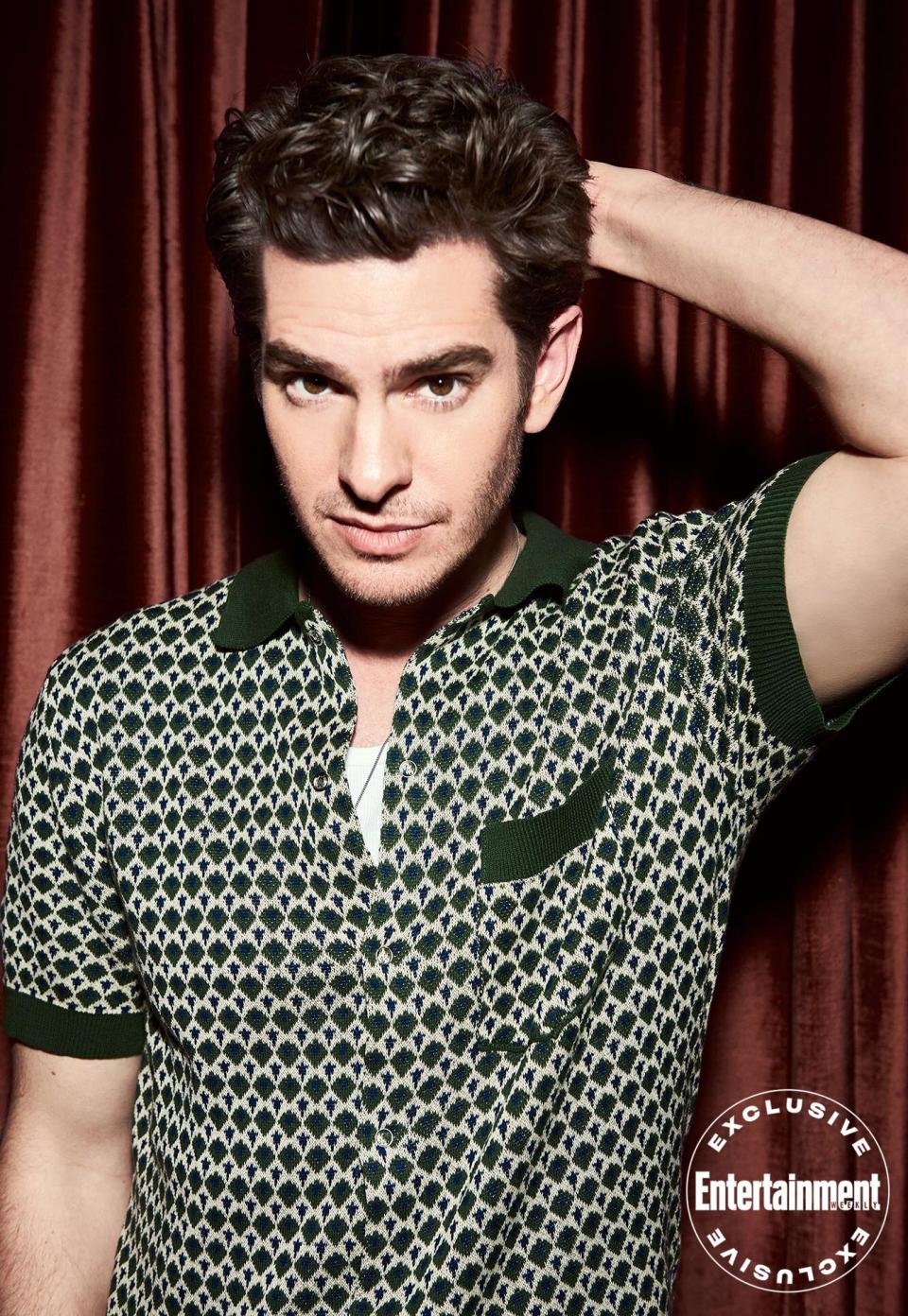
Jessica Chou for EW
For both of you, what's your go-to musical theater karaoke song, since we're in a piano bar?
GARFIELD: Mine is [starts singing], "So you wanna be a boxer in the golden ring? Can you punch like a southbound freight train? Tell me just one thing. Can you move in a word like a hummingbird if you really need to? Ooo, that's fast. Can you bob? Can you weave? Can you fake and deceive when you need to? Well, you might as well quit if you haven't got it." That's from Bugsy Malone.
DE JESÚS: See, he can sing! My go-to karaoke song is always a group number, so it's going to be "Summer Nights." Because everybody wants to shoo-da-bop-bop, shoo-da-bop-bop.
Do both of you have a dream musical theater role?
GARFIELD: It's hard to not think about wanting to someday, if I could get to the point, to do Seurat in Sunday in the Park With George. That would be crazy.
DE JESÚS: For me, it's the Baker in Into the Woods. I want to play the Baker. I want to play Freddy in Dirty Rotten Scoundrels. There's one more that I said the other day: Mrs. Lovett because I want to see a woman play Sweeney.
GARFIELD: Who would be your Sweeney?
DE JESÚS: Can you imagine Audra [McDonald] doing Sweeney? I would be her mini-Lovett.
What do you wish Jon could see about the film or hope he is seeing?
DE JESÚS: His ripple effect — that he's lasted. That he is the epitome of white ally-dom, too. When I think about all of the Black and brown folks that he gave employment to, and that he not only gave them employment, he gave them real roles that were layered, that were complex, that were messy, but weren't judged because of that. People bought homes because of him. All those people that did that show for years and years and years, he gave a quality of life to several Black and brown folks. There are mother f---ers out here that can't do that now.
GARFIELD: That he can see himself being a symbol of and an advocate for everyone bringing their gifts to the world. That's what he was, including, in the way you just described, to communities that really need that advocacy and really need that allyship. But also for just any artist that is struggling or that has any doubt about what they're supposed to be doing with their time, that he can be this bastion of hope, this eternal flame in our imaginations that reminds us of our calling. The world does need more soul. The world needs more artists. There's a line in our fight when Michael says, "Oh, yeah, because that's what the world really needs is more art." And I improvised and was like, "Actually, yes!" because that felt like Jon coming through. Because I think Jon saw that art saves. Art saves lives.
Related content:

